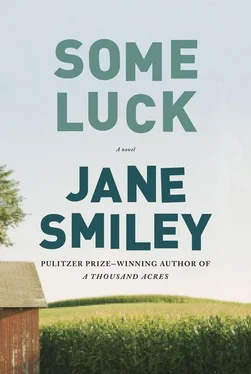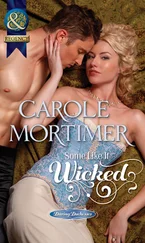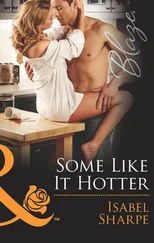Really, it was amazing, Walter thought, as he sharpened the shears, how things about your farm that you didn’t mind — or hardly even noticed — when you bought it, came to wear you down over the years. When you first walked onto your place, you were so glad to have it that everything looked good. Or perfect. Then, year by year — it had been six years now, six springs, summers, falls, and winters (mud, heat, harvest exhaustion, snow) — all the extra steps began to tell on your affections. And every wrong thing about a farm involved extra steps: that was what that long, impenetrable hedge represented to Walter.
Even so, Walter knew he was less and less able to imagine any other life. He was thirty now. Ten years before, he’d been working for his father — head down, it felt like, his eyes lifted only as far as the next hill of corn. He’d had skills his father approved of, like planting a cornfield in a perfect grid, or fixing a harness so it looked practically new. And then, not unlike a bomb blast, two years after that, where was he, northern France, if you called Cambrai France (some people didn’t, they called it “Kamerijk”), and the grid of corn had turned into acres of blood and mud, and what he noticed wasn’t the tanks they’d used there, supposedly for the first time ever, but the fugitive birdcalls in the din and tiny purple berries in the blasted hedges. Except for the tanks and the fighting and the trenches, Cambrai had looked almost familiar, so flat was it, the horizon low against the sky. And then that was over and he had the influenza on his way home, in Georgia, and he recovered, and Howard, on the farm with his parents, did not, though his mother did, and over the years she had said more than once, “It should have been me that died,” at which point his father would leave the room and his mother would put her face in her hands. The only thing Walter knew to do was to pat her on the knee.
But here he was, and prices were up, and there was Rosanna, and all his ideas about some of those towns he had passed through — Cedar Rapids, Chicago, New York, London, Paris — had simply vanished. He’d been a farm boy. And now he was a farmer, and no longer a boy, and it was disorienting how quickly Frankie was superseding him as the hope of his own father and mother and wife for something that had nothing to do with Osage-orange hedges and badly sited barns and too many cows and not enough hogs (or vice versa).
Well, the clipping was easy when he got down to it — he could go along one side in the morning and the other side in the afternoon and get the whole thing done in a day, and then there it stood, stiff and solid and thorny — a thorn in his side, but only in his side, since his father wished he had something like it — what drove his father crazy about cows was the way they leaned against every fence, but no cow leaned against an Osage-orange hedge — and Frankie loved to throw the hedge apples at the side of the barn, and Rosanna thought the seeds were delicious, if only you could get at them more easily, and the wood burned slow and hot in the winter. Rosanna liked it, too, because you could split one of the fruits, which were certainly not oranges, and rub it along the baseboards and door and windowsills of the house, and it kept out insects and spiders. Sometimes, Walter even cut fence posts from the stems of the hedge — they were straight and strong. The list went on. Walter pricked his thumb on a thorn, but, then again, you could do that on barbed wire, too, as he’d done so many times.
IF ANYONE REMEMBERED that rearing a child on a farm was dangerous, it was Rosanna. Always her eye was out the window. Always she was stepping to one side to look through a doorway. Always she was making sure the gate across the steps leading down from the front porch to the wide, wide world (and particularly the road) was closed. Always she was putting shoes and boots outside and washing hands, not to mention handkerchiefs and bandannas. Walter had been offered a nice yearling bull for free, but Rosanna wouldn’t let him get one until … well, she hadn’t decided. And no large hogs, only feeder pigs that got sold after a few months. The children didn’t play in the barn by themselves and were not allowed in the loft, even though Rosanna’s own brothers and cousins had loved sliding and jumping in the oat hay. She herself had loved it, the stalks were so smooth and fragrant, but a child someone knew, somewhere, well, something had happened to him about hay, she didn’t know what. What she did know was that some farmers understood that the death of someone around the farm, often a child, was the price of farming. Sad but true, and in all ways, not only that one, the price of farming was high.
On the day it happened, she was not thinking about these things, but she had been, and later she did again. That day, a Saturday, it was raining. Dinner was finished — a simple meal of leftover potatoes and some pieces of chicken. Ragnar and Irma had gone to town, and Walter was out in the barn, fixing the corn sheller — he and Ragnar thought this rain would be followed by frost, and after that would come the corn harvest. Walter was good at using all his spare moments to get his equipment into shape.
Rosanna was knitting. She had some nice wool, not from their own sheep (which was a little coarse, she thought), but fine dark-gray fiber from a flock of Leicester Longwool sheep that a friend of her mother’s had down by Newton. She was making Walter a sweater for Christmas, with cables, and she didn’t want him to see it, so she could knit only when he was outside or away. Joey had his box of dominoes on the couch — she had talked him into accepting a new box. She had her eye on Frankie, who had his eye on the dominoes but knew better than to touch them, at least when Rosanna was in the room. To Frankie she had given a deck of cards. At the moment, he was turning them over one by one, but any minute, she knew, he would ask her to play a game with him — they would probably end up playing old maid, which Frank didn’t like much but would play. He looked up at her. She said, “Why don’t you try building a house? Remember, we did that?”
“That was hard.”
“Yes, but it gets easier with practice. Uncle Rolf once used almost the whole deck.”
“How many?”
Rosanna turned her work and made something up: “Forty-six cards.” This shut up Frank.
Now she turned to Mary Elizabeth, who had been stacking blocks but looked up at a flash of lightning in all the windows, and the subsequent clap of thunder. In fact, all of the children looked at her, but she said, “At least five or six miles away, and moving west.” Of course she was afraid of lightning — anyone in country as open as this had to be. But they were inside, that was reassuring, and the house and the barn both had lightning rods. Who was it—
Mary Elizabeth stood up, and the thunder clapped again, and Mary Elizabeth started jumping up and down. She was not crying and didn’t seem afraid, just excited, was what Rosanna was thinking as she held out her hand toward the girl, and at that very moment the windows lit up, and Mary Elizabeth went down, flat down, on her back, and she hit the back of her head on the corner of a wooden egg crate, and as the thunder clapped, she was utterly silent and still. Rosanna stared at her, her own hands lifted with her knitting. It was Frankie who said, “Mama, what happened?”
Rosanna threw down the knitting and lunged forward from her rocking chair, but then she knelt beside her baby without touching her. The windows lit and thunder clapped again, and the rain outside seemed to pour down on the roof and the porch as out of a bucket, and Rosanna had no idea of any kind what to do.
Distractedly, she took Mary Elizabeth’s hand in her left, and placed her right palm on the girl’s forehead, as if there might be a fever, but of course there was nothing of the sort. Rosanna said, “Mary Elizabeth? Honey?”
Читать дальше












